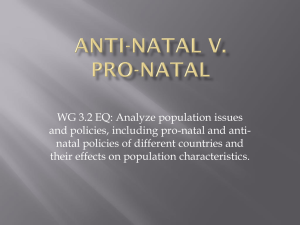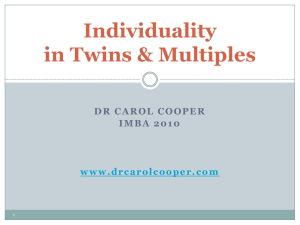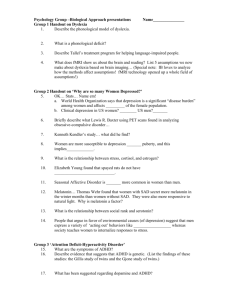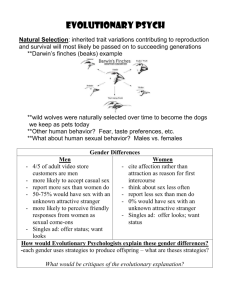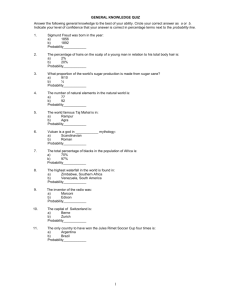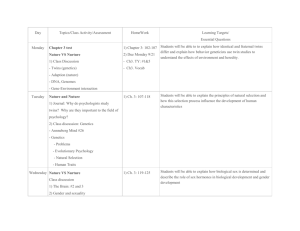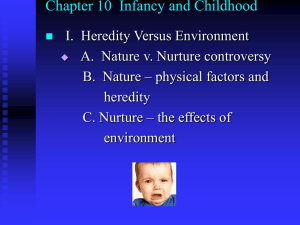Practice Midterm - Wharton Statistics Department
advertisement
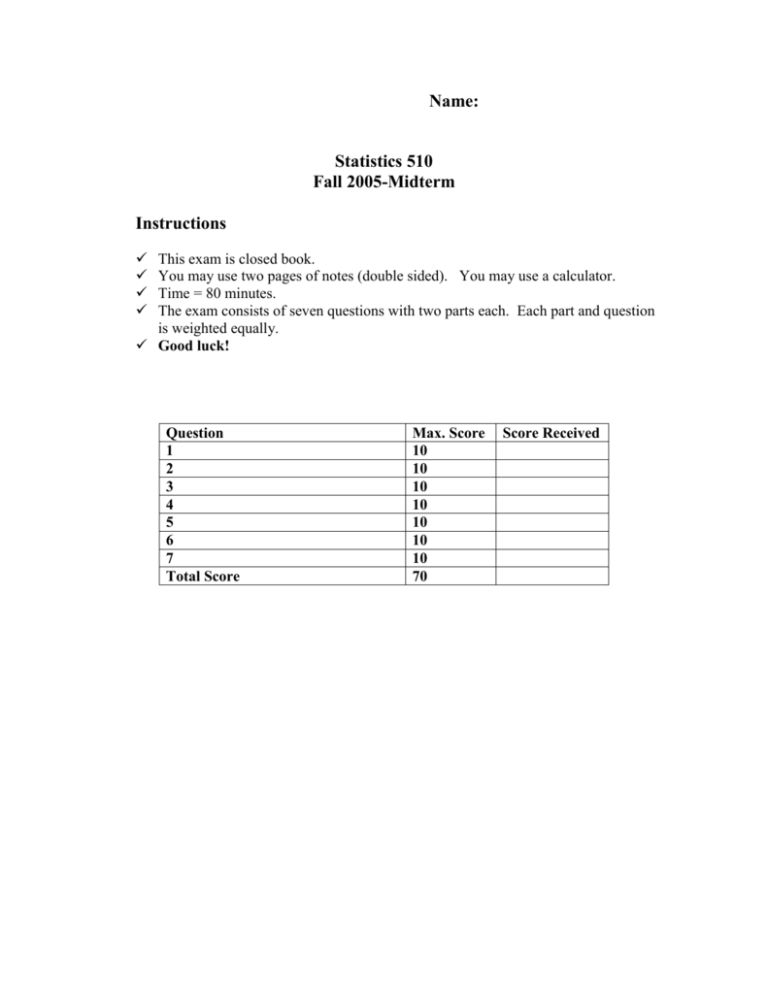
Name:
Statistics 510
Fall 2005-Midterm
Instructions
This exam is closed book.
You may use two pages of notes (double sided). You may use a calculator.
Time = 80 minutes.
The exam consists of seven questions with two parts each. Each part and question
is weighted equally.
Good luck!
Question
1
2
3
4
5
6
7
Total Score
Max. Score
10
10
10
10
10
10
10
70
Score Received
1. Approximately one-third of all human twins are identical (one-egg) and two-thirds are
fraternal (two-egg) twins. Identical twins are necessarily the same sex, with male and
female identical twins having equal probability. Among fraternal twins, approximately
one-fourth are both female, one-fourth are both male and half are one male and one
female. Finally, among all U.S. births, 1 in 90 is a twin birth. Define the following
events:
A = {a U.S. birth results in twin females}
B = {a U.S. birth results in identical twins}
C = {a U.S. birth results in twins}
(a) State, in words, what the event A B C represents. Find P( A B C ) .
(b) Twelve pairs of twins gather together in a room. Assume that the probability of each
pair of twins having a birthday in a given month is 1/12 and the birthdays of the 12 pairs
of twins are independent. What is the probability that no two of the pairs of twins
celebrate their birthday in the same month?
2. An absent-minded professor has three pairs of shoes in his closet -- one pair of black
shoes, one pair of brown shoes and one pair of white shoes. Each pair consists of a right
shoe and a left shoe.
(a) If the absent-minded professor randomly draws two shoes from his closet without
replacement, what is the probability he will get a pair?
(b) If the absent-minded professor randomly draws a right shoe and a left shoe, what is
the probability he will get a pair?
3. Suppose that an ordinary deck of 52 cards is shuffled and the cards are then turned
over one at a time until the first ace appears.
(a) Given that the first ace is the 15th card to appear, what is the conditional probability
that the card following it is the ace of hearts?
(b) Given that the first ace is the 15th card to appear, what is the conditional probability
that the card following it is the seven of diamonds?
4. A company has four senior executives: the CEO (chief executive officer), the COO
(chief operating officer), the CMO (chief marketing officer) and the chief counsel. For a
resolution to pass, one of two things must occur:
1) The CEO approves the resolution and at least one out of three of the other officers
approves;
2) The CEO does not approve, but all three of the other officers approves.
Assume that the probability that any of the officers approve of a given proposal is .6. In
addition, assume that their decisions are independent.
(a) What is the probability that the resolution will pass?
(b) If the resolution passes, what is the conditional probability that the CEO approved?
5. When coin 1 is flipped, it lands heads with probability .4; when coin 2 is flipped, it
lands heads with probability .7. One of these coins is randomly chosen and flipped 10
times independently.
(a) What is the probability that exactly 7 of the 10 flips land on heads?
(b) Given that exactly 7 of the 10 flips lands on heads, what is the conditional probability
that the coin chosen was coin 1?
6. A royal straight flush in poker consists of an ace, king, queen, jack and ten of the same
52
suit (Assume that we are playing five card poker and each of the poker hands are
5
equally likely)
(a) Find an exact expression for the probability of being dealt a royal straight flush (you
do not need to numerically compute the value of this expression).
(b) The probability you found in part (a) of being dealt a royal straight flush should be
about 1.6 106 . Suppose that an avid poker player sees 100 hands a week, 52 weeks a
year, for 20 years and that the hands are independent of one another. What is the
approximate probability that the poker player will never see a royal straight flush dealt?
What is the approximate probability that the poker player will see exactly two royal
straight flushes dealt? Give actual numbers, rather than just expressions.
7. Let X be a Poisson random variable with parameter .
(a) In part (b), we will prove that E[ X n ] E[( X 1)n1 ] . Use this result to compute
E[ X 3 ] .
(b) Prove that E[ X n ] E[( X 1)n1 ] .
